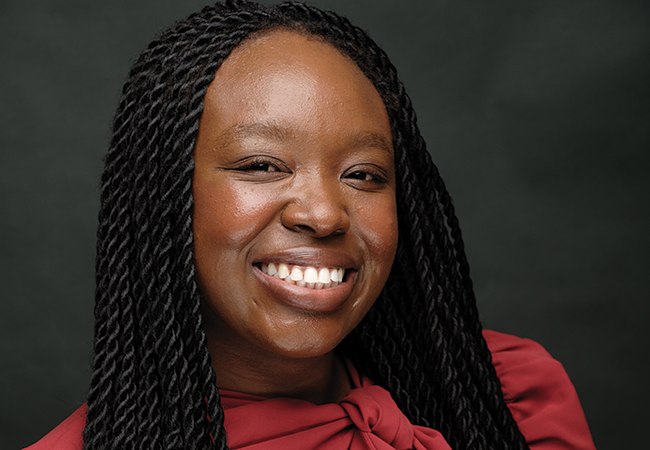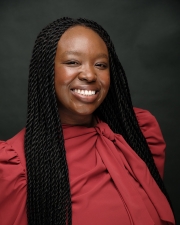Provost’s Postdoctoral Fellow investigates impact of instructional coaching

Kemi Oyewole’s experiences — from studying economics and organizational structures to teaching fifth grade — have sparked a deep curiosity about teacher experiences and a drive to research professional instruction. As a Provost’s Postdoctoral Fellow at Penn GSE, she explores how academic leadership, particularly educational coaches, can advance educational equity and strengthen educator support.
Oyewole is a first-year fellow in the Penn Provost’s Postdoctoral Fellowship program, which provides mentorship, funding, and research support for emerging scholars. Fellows work across Penn’s colleges, and Penn GSE currently hosts three Provost’s Fellows who engage in teaching and research and collaborate with faculty mentors during one- to three-year terms. Oyewole works in Penn GSE’s Policy, Organizations, Leadership, and Systems Division.
Her drive to improve educators’ professional development and study instructional coaching stems from her time in the Boston Teaching Residency, where she taught public elementary school and earned her master’s in education. As an apprentice teacher at a Boston public school, Oyewole witnessed the challenges of working at an under-resourced school despite the dedication of its staff and students.
“Everyone was working hard and learning great pedagogy, but the implementation was so difficult,” she said.
She was particularly interested in the role of instructional coaches. The school’s coaches were often pulled into administrative or classroom duties or bogged down by paperwork rather than supporting and advising educators.
The experience led Oyewole to Stanford’s Graduate School of Education, where she pursued a doctoral degree and examined how instructional coaches are supported and developed. Oyewole spent several years studying a group of instructional coaches to determine how professional learning networks help them succeed.
Now, as a first-year fellow at Penn GSE, Oyewole is expanding her doctoral research with additional inquiries and opportunities for fieldwork, writing, and publishing.
“I have empirical data collected with a coaching network, but, as a postdoc, I have deeper questions,” she said.
Her current research examines the history of instructional coaches, how the role has evolved, and coaches’ experiences in various settings, including rural, suburban, and urban districts.
Oyewole’s interest in educational organization and policy is informed by her undergraduate experience at Spelman College, where she majored in economics and mathematics. The Spelman experience instilled a desire to support the needs of underserved communities and motivated Oyewole to join the Boston Teacher Residency.
A Southern California native, she returned to academia to deepen her understanding of educational leadership. A staff member introduced her to a network of 45 instructional coaches from a single school district. A district administrator cultivated a professional network so coaches could share ideas, best practices, and support.
“This group of people connected based on their needs,” Oyewole said.
She observed that instructional coaches were often pulled away from their intended roles — supporting teachers — to act as substitutes, office assistants, or testing facilitators. This finding aligns with previous research that revealed coaches spend less than half of their time working directly with teachers.
“Here are folks supposed to help us improve instruction, but that seemed like a long-term goal divorced from immediate crisis and needs,” she said.
Meeting monthly with the network, their supervisor, and small subsets, Oyewole studied how and why the coaches connected — whether for advice, support, or information sharing. Some coaches said they felt isolated, while others were frequently consulted for their opinions and experience. She found women of color were often asked for advice.
“Women of color were sometimes the most experienced and transparent about their challenges and how they tried to move work forward,” she said.
While these partnerships provided abundant insights, Oyewole believed the Provost’s Postdoctoral Fellowship at Penn GSE would give her time and resources to expand her work. She plans to visit diverse school districts, interviewing coaches, board members, and administrators to understand how coaching programs are designed, implemented, and sustained over time — and how to increase success.
Additionally, Oyewole collaborates on research with her advisor, Associate Professor and Civics House Director Rand Quinn. She also draws on resources at the McGraw Center for Educational Leadership and the Penn Civic House to promote civic engagement and civil discourse. Oyewole plans on attending conferences on educational leadership and sociology, too.
“At Penn GSE, so many scholars are thinking broadly about the social context of education,” she said. “Having peers with similar commitments to community and diversity is incredibly beneficial.”

